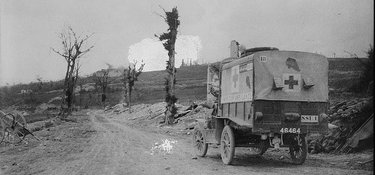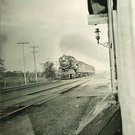Garnering strength from history and comfort from moments of interconnectedness
To the Editor:
It is in times of great struggle that we look to the past for guidance.
I have found myself revisiting the letters of my Great Uncle Luther, who volunteered as an ambulance driver in the Great War, written from the front to his future wife and fellow Altamontian, Margaret Kirk.
His stories of courage and bravery while tending to the wounded on the battlefield call to mind our heroes of today. Though our battle is quite different, our health-care workers continue to be heroes nonetheless.
There is nothing like the words of an individual (just barely a man), who survived World War I and then the flu of 1918 to help put things in perspective. In a letter dated Jan. 31, 1919 he writes, “Something in your letter tells me that you have been sick, well here’s hoping that it’s nothing serious and you will be well soon. The grippe has been quite prevalent around here but so far I escaped it.”
We as a village, as a nation, and as a global community continue to face great individual and collective challenges. We face losses or reduction of employment, the closing of beloved family businesses, struggles of a home/work/life balance, the challenges of educating and supporting our children, social and racial injustice, division throughout our nation, the pain of watching our loved ones spend their final days in isolation in nursing homes and hospitals, and health issues that would have been a challenge without a pandemic now bring with them increased risks and fears.
All we can do is garner strength from history and find comfort in moments of interconnectedness — however small they might be.
And so, as we do each year, and as my family has done for decades, we invite the community to appreciate the quieter moments by welcoming a new generation to sled on Kirk Hill.
Of course, there are grander hills to sled and more exciting adventures to be had. But for 50 years sledding on Kirk Hill has been about appreciating the slower, smaller, quieter moments.
Keeping an eye turned toward the little things, like the snow prints of the red fox, the deer, and the wild turkey that use the hill throughout the year. The often imperceptible babbling of the creek beneath sheets of ice. The creak and breath of the icy smelling hemlocks.
The companionship of family and friends on a cold winter’s day. For it is in these darkest days when we realize that this is what’s most important.
Jen O’Connor
Eric Krans
Altamont
Editor’s note: Kirk Hill is behind Jen O’Connor and Eric Krans’s house at 167 Maple Ave. in Altamont. O’Connor writes a letter to The Enterprise every year, inviting children to sled there. This year, she included the following excerpt from a letter postmarked Dec. 1, 1917.
From Luther C. Warner
to Margaret Kirk of Altamont
Dear Margaret,
In our particular sector we carry the wounded from the third line trenches to ambulances (temporary divisional Hospitals) where other “voitures” of our American Ambulance Section evacuate to permanent Hospitals some fifteen kilometers to the rear. Out of curiosity more than anything else two fellows and myself went for a trip to the first line trenches and ended up in “No Man’s Land.”
We became quite chummy with a French Sous Lieutenant and his Captain. The Sous Lieut. could speak some broken English and with his Aspirant (his immediate inferior in command) speaking German and Spanish we managed to understand each other when we talked simple sentences … This night they were taking their command to the trenches and since we were going with them they invited us to take dinner with them.
It had been rainy part of the day and so we put on our oldest clothes preparing for the mud of the trenches. With our helmet and gas mask which we always carry we were on deck at 4:00 P.M. After meeting a few more of their friends and getting acquainted we started in to eat.
This was rather an auspicious occasion for us and you would agree if you could see all the things we were to eat. We even had a little menu — written in French of course — but think of it in the trenches! At the time we were eating there was what the French call a “coup de main” on the right of our sector.
Such a little attack may be made by either French or Germans but on this night it was pulled off by the Boche. At the same time there was an attack on the Army to our left. And we were to leave for the first line after dinner; well not one of the three in our group said anything …
The Officers saw the fearful expressions on our faces and assured us that the coup de main was not where we were going. Still that left the unforgettable feeling that an attack might be pulled on us as we were going up.
We had agreed to stick it out through whatever may come and we started after dark about 6 P.M. The Sous Lieutenant came with the three of us and we tried to walk like brave men should. In order to save time and avoid mud we cut across a field which was in a straight line with the place to which we were going.
This field was one which had been quite well filled with big shell holes by the Boche and it seemed to me that not one was missed by us. These holes are from one to four feet deep. They were however only small ones compared with some I’ve seen. We saw many interesting things such as lights etc. on the way to the abri but these would be censored.
There is a little railroad running through the trenches and we passed little cars carrying wounded men on the way to the posts from which we carry them in our voiture to the ambulance back of the lines. On the rails are plates which hold them together and some are loose.
One of our fellows continued to step on them and they make an awful loud noise. We were told to keep fairly quiet so the Boche would not hear us. It was only after much persuasion and warning that we could get this fellow to walk to the side as this continued — the noise on the iron was getting on our nerves as we neared the front lines. If they had heard us a rapid fire machine gun from the enemy might have played havoc with us.
We were shown various interesting things in the first line; then the Officer asked if we wanted to go on a Patrol in “no man’s land.” There was no response for a few seconds, our hearts were in our throats and our tongues paralyzed.
They assured us there was no danger and one fellow had the nerve to answer, “Y….e….s..” With this we started led by a Sergeant who was on duty in that sector and the Aspirant of the Company. They knew every inch of the ground through barb wire and shell holes.
There we met other men stationed on sentry duty. We greeted them and told them we were Americans. Words can’t express how glad these fellows were to see us. Think of them standing there peering through the darkness trying to watch German operations.
I was first in line going out and coming back I was last. I had just opened a new package of cigarettes and was offering one to the French sentries when I observed that the rest of the party was about ten feet ahead of me. Not knowing the way in this God forsaken country I left the whole package there and ran after them.
I’m not usually as generous as this but I thought it would pay this time. No one said anything when we got back to the first line but I’m sure we each heaved a mighty big sigh of relief. One of the boys said “If Mother could only see me now ….”
Luther C. Warner, S.S.U. 14

